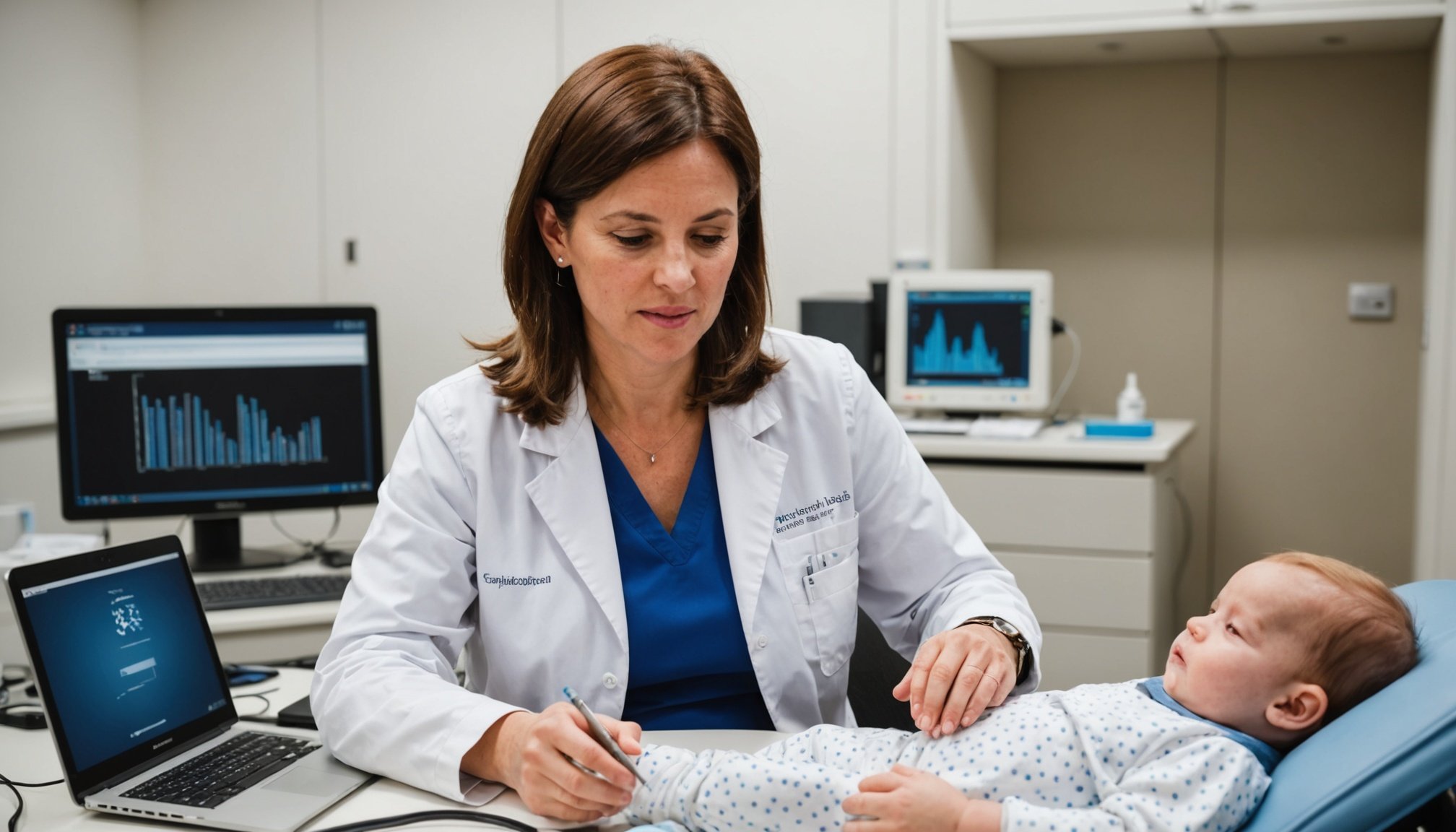Overview of Non-Invasive Prenatal Testing
Non-Invasive Prenatal Testing (NIPT) has revolutionised prenatal care by offering a safe and effective way to screen for chromosomal abnormalities in a fetus. This testing method analyses fetal DNA circulating in a pregnant woman’s blood, reducing the need for invasive procedures like amniocentesis, which carry risks of miscarriage.
The purpose of NIPT is to provide early detection of conditions such as Down syndrome, trisomy 18, and trisomy 13. Unlike traditional methods, NIPT offers parents significant peace of mind sooner rather than later in the pregnancy, without the associated physical risks.
Have you seen this : Essential Tips for Effectively Recording Pregnancy Milestones and Health Records in the UK
Historically, prenatal testing was more intrusive. Major advancements in the late 20th century allowed the development of non-invasive techniques. Initial breakthroughs occurred in the 1990s when cell-free fetal DNA was first discovered in maternal plasma. Since then, continued research and technological improvements have enhanced NIPT’s precision and reliability.
In terms of current prevalence, NIPT has gained widespread acceptance in many parts of the world, including the UK. It is increasingly used, with adoption rates continuing to climb as more healthcare providers recommend it as a standard part of prenatal care. This popularity stems not only from its safety but also from its early and accurate results, heavily influencing modern prenatal screening practices.
Topic to read : Essential Insights on Advanced Maternal Age: Key Considerations for UK Women Welcoming Their First Child After 35
Recent Scientific Breakthroughs in NIPT
Recent scientific advances in non-invasive prenatal testing (NIPT) have ushered in a new era of prenatal care, marked by improved accuracy and innovative technologies. These NIPT innovations are primarily focused on enhancing the effectiveness of genetic analysis to provide more reliable outcomes for expectant parents.
One of the most significant breakthroughs in NIPT technologies is the integration of advanced sequencing techniques. These methods enable detailed analysis of fetal DNA, which is crucial for detecting genetic anomalies with higher precision. By accurately pinpointing chromosomal conditions, such as Down syndrome, the advances ensure expectant parents receive trustworthy insights.
Studies have consistently demonstrated that these scientific advances lead to marked improvements in the accuracy of NIPT results. For instance, recent trials have shown significantly lower false-positive rates, which reduces unnecessary stress and follow-up invasive testing for pregnant women.
The role of genetic analysis in the evolution of NIPT cannot be overstated. Enhanced genetic algorithms and bioinformatics tools provide a deeper understanding of fetal genetics, making it possible to screen for a broader range of conditions than before. This has not only enhanced NIPT reliability but has also extended its scope, offering a comprehensive profile of fetal health. Such NIPT innovations continue to shape the future of prenatal care.
Technology Behind NIPT
NIPT Technology revolves around advanced genetic testing methods that provide expectant parents with an insight into the health of their unborn child. Foremost among these technologies is next-generation sequencing (NGS). Unlike traditional methods, NGS is highly precise and can sequence numerous small DNA fragments simultaneously, offering a broader view of the fetal genome. This results in more accurate detection of potential chromosomal abnormalities, such as Down syndrome, compared to traditional karyotyping.
One of the core innovations in NIPT lies in its data processing and risk assessment algorithms. These groundbreaking algorithms can efficiently analyse immense datasets, refining the accuracy of risk predictions. By integrating advanced computational methods, such as machine learning, these systems continuously improve and adapt, providing better predictive power over time.
Traditional genetic testing methods often relied on invasive procedures, which carry a risk of miscarriage. In contrast, NIPT technology is non-invasive, using a simple blood sample from the mother. This shift not only ensures greater safety but also enhances the comfort of expectant mothers.
The comparison between next-generation sequencing and more conventional methods highlights the significant strides in genetic testing. As these technologies continue to evolve, they promise even more precise and accessible prenatal diagnostics, offering peace of mind to many families.
Regulatory Landscape for NIPT in the UK
Navigating the NIPT Regulations in the UK can be intricate, as multiple regulatory bodies oversee the process. The Human Fertilisation and Embryology Authority (HFEA) plays a critical role by ensuring that healthcare providers adhere to the standards established for Non-Invasive Prenatal Testing. Moreover, the National Institute for Health and Care Excellence (NICE) evaluates and provides guidelines to maintain Healthcare Compliance pertaining to NIPT services.
Recent changes in policies have significantly shaped the availability of NIPT, making it an area of interest. For instance, the updated 2023 NICE guidance has expanded the criteria for offering NIPT as part of routine prenatal care. This expansion aims to improve early detection of genetic conditions, thereby benefiting a broader spectrum of patients.
Implications of these regulations for healthcare providers are substantial. They require the integration of strict compliance protocols and adjustments in service offerings to align with the guidelines. Likewise, patients are affected by these regulatory changes as they gain increased access to NIPT, although they may also face decisions regarding test selection and interpretation.
Ensuring adherence to these regulations not only protects patient welfare but also enhances the overall quality of prenatal healthcare service delivery in the UK.
Benefits of NIPT Over Traditional Testing
In the realm of prenatal care, the benefits of NIPT (Non-Invasive Prenatal Testing) are gradually eclipsing those of traditional prenatal testing. With advancements, NIPT offers significant advantages, distinguishing itself from more invasive methods. Traditional methods, such as amniocentesis, involve potential risks due to their invasive nature, which can cause worry and discomfort for many expectant parents. In contrast, NIPT is non-invasive, requiring merely a blood sample from the expectant mother, thus promoting safety and comfort.
One of the key benefits of NIPT is its ability to provide results at an earlier stage in the pregnancy, enabling timely and informed decisions. This early detection capability often surpasses traditional methods, which might not deliver results until later, potentially increasing parental anxiety. NIPT’s accuracy also stands out, significantly reducing the likelihood of false positives, which are more common with traditional prenatal testing. This ensures that expectant parents receive precise information to aid in their decision-making processes.
By reducing procedural risks and emotional stress, NIPT fosters a more reassuring prenatal testing experience for parents. The profound benefits of NIPT over traditional prenatal testing demonstrate its growing importance in modern healthcare, reshaping how prenatal assessments are approached.
Ethical Considerations Surrounding NIPT
Navigating the ethical terrain of Non-Invasive Prenatal Testing (NIPT) is essential for understanding its wider implications. Ethical issues arise, especially when prenatal testing is linked to genetic information. For parents, using NIPT raises concerns about the burden of decision-making. Knowing the genetic profile early can help. It might allow medical planning but also confronts them with difficult choices.
The possibility of selective termination presents profound ethical dilemmas. Parents might face societal pressure to make decisions based on genetic findings. Is it ethical to make choices based on potential disabilities? This question challenges societal values and ethics surrounding parental decision-making. It reflects broader societal implications. If the decision is rooted in eliminating genetic disorders, what message does this send to individuals living with disabilities?
Moreover, the ethics surrounding NIPT extend to privacy concerns. How is one’s genetic information handled? The confidentiality of such sensitive data must be paramount. The management of this information can influence trust in prenatal testing processes, subsequently impacting parental decision-making.
Considering these ethical issues, it is vital to address both societal perspectives and personal values. Balancing these concerns with the advantages of NIPT involves thorough introspection by prospective parents and society.
Expert Insights and Research Findings
Non-invasive prenatal testing (NIPT) has garnered significant attention due to its potential to revolutionise prenatal care. Expert opinions consistently highlight its accuracy and safety compared to traditional methods. Specialists advocate for NIPT, emphasising its non-invasive nature, which mitigates the risks associated with invasive tests like amniocentesis.
Recent NIPT research in the UK underscores its efficacy. A study showed that NIPT detected 99% of Down syndrome cases, illustrating its precision. Additionally, findings revealed an increased uptake among expecting mothers, demonstrating growing trust and satisfaction.
Looking ahead, experts predict that NIPT will become a cornerstone in healthcare. With advancements in genetic technologies, the potential for widespread adoption is imminent. Experts foresee NIPT expanding its scope—possibly including more genetic conditions in its screening capabilities, thereby offering a comprehensive prenatal assessment.
Despite its promise, challenges exist. The cost and availability of NIPT pose barriers. However, experts are optimistic that as technology progresses, costs will decrease, making NIPT accessible to a broader population.
Ultimately, expert interviews reflect a consensus that NIPT is pivotal to safer and more effective prenatal testing, setting the stage for its integral role in future healthcare paradigms.
Specific Applications of NIPT within the UK Healthcare System
Non-Invasive Prenatal Testing (NIPT) has become a significant advancement in the UK healthcare system, enhancing prenatal care by offering accurate screening options. Currently, NIPT applications in clinical practice include testing for chromosomal abnormalities such as Down syndrome, Edwards syndrome, and Patau syndrome. NIPT is integrated into existing prenatal care pathways as a safer, more reliable way to gather genetic information without the risks associated with invasive procedures like amniocentesis.
This integration allows expectant parents to make better-informed decisions early in the pregnancy. The UK healthcare system has adopted NIPT as a routine offer to pregnant women, especially those assessed to be at higher risk of genetic disorders. This application is not only increasing prenatal testing accuracy but also providing psychological benefits to patients by reducing procedural anxiety.
Case studies within the UK provide compelling evidence of successful outcomes attributed to NIPT use. For instance, one notable account involved a couple in England who, after a positive NIPT result, received early guidance and support from specialised genetic counselling services. Such examples demonstrate how NIPT applications are effectively integrated into the healthcare pathways, resulting in timely and improved patient outcomes. These developments underscore the pivotal role of NIPT in modern prenatal care.











